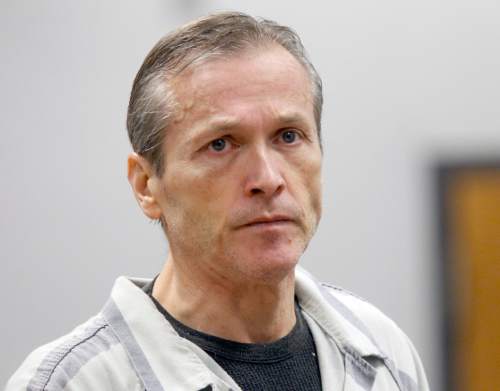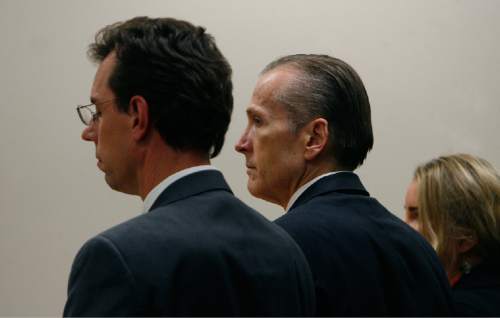This is an archived article that was published on sltrib.com in 2016, and information in the article may be outdated. It is provided only for personal research purposes and may not be reprinted.
Appellate attorneys for Martin MacNeill, who was convicted several years ago of murdering his wife and sexually abusing his adult daughter, were in court Tuesday, where they argued that the former doctor did not get a fair trial in the sexual abuse case because of the headline-grabbing murder prosecution.
At the 2014 abuse trial, daughter Alexis Somers told jurors her father touched her inappropriately and that she believed her father murdered her mother, Michele MacNeill.
Appellate attorney Jonathan Nish argued Tuesday before the Utah Court of Appeals that Martin MacNeill's trial attorney, Randy Spencer, failed to object to this testimony and should not have allowed anything about the murder investigation to be mentioned.
But Assistant Utah Attorney General Erin Riley said that it was Spencer's trial strategy to allow Somers' allegations to air during the trial. Spencer used this allegation, along with evidence of a custody battle between Somers and her father over Somers' younger sisters, in an attempt to show that Somers had a motive to falsely report that she was sexually abused. It was a risky strategy, Riley said, but likely one of the only strategies available in a mostly he-said, she-said case where the defendant did not testify.
"[Spencer] wanted the jury to focus on his argument that the victim was so angry at MacNeill, she would have done something like falsely accuse him," Riley said.
But Nish said that even if it was Spencer's trial strategy to allow jurors to hear talk of a homicide, it was harmful to Martin MacNeill and amounted to ineffective assistance of counsel.
He said that by allowing Somers to accuse her father from the stand, it biased jurors and caused them to convict him of sexual abuse.
Nish also argued that the sex abuse trial should never have taken place in Provo, where his client had been convicted by a jury months earlier of first-degree felony murder in his wife's 2007 death.
"One must question if it is sound legal policy to try a person where they were recently convicted of the highest profile murder that Utah County has seen in decades," Nish said. "It just wasn't a good idea. Simple as that."
If the appeals court judges agree that a change of venue was needed or that Spencer was ineffective, Nish told The Tribune that MacNeill, now 60, would be granted a new trial. MacNeill's attorneys also argued that their client's right to a speedy trial was violated. If the judges rule in their favor in that claim, the sexual abuse case would be dismissed. The court took the case under advisement and will issue a written ruling.
Martin MacNeill is serving a one-to-15-year prison sentence for the second-degree felony forcible sexual abuse conviction, on top of a 15-year-to-life sentence for the first-degree felony murder conviction. His first hearing in front of a parole board is set for 2052.
Two of MacNeill's daughters, Somers and Rachel MacNeill, were in court Tuesday. Somers said afterward she didn't feel the claims had merit, and that it was her father's own fault for asking to delay the sexual abuse trial until after the murder case was completed.
Somers said she felt it was important that she report the sexual abuse to police, and that her case went to trial in order to protect other potential victims from Martin MacNeill.
"My father is a dangerous man," she said Tuesday, "And he needs to spend the rest of his life in prison."
The Tribune generally does not identify victims of sexual abuse, but Somers agreed to be named, saying she felt it was important to come forward and publicly "fight for truth and justice."
The sexual abuse occurred on May 23, 2007, about five weeks after the death of MacNeill's wife, 50-year-old Michele MacNeill.
Somers testified at a July 2014 trial that she was alone sleeping on her parents' bed when she woke to find MacNeill rubbing her buttocks and licking and kissing one of her hands. She said her father told her, "Oh, oh, I'm sorry, I'm sorry. I thought you were your mother."
Martin MacNeill is also appealing his murder conviction, arguing in court papers that the testimony of several witnesses was tainted. He also argued that the Utah County Attorney's Office withheld thousands of pages of evidence that could have helped him prove his innocence. His attorneys are expected to argue that case before the Utah Supreme Court on Aug. 9.
At the 2013 trial, prosecutors convinced a jury that MacNeill drugged his wife, then drowned her in a bathtub at their Pleasant Grove home on April 11, 2007. The jury heard from a number of witnesses, including Martin MacNeill's mistress, Gypsy Willis, several of Martin MacNeill's eight children and two inmates — one in jail and the other in federal prison — who claimed he confessed the murder to them.
Prosecutors weaved a narrative that Martin MacNeill's bad or odd behavior — including the growing seriousness of his affair with Willis, his insistence that his wife have a face-lift, asking that extra medications be prescribed to her and his reaction to his wife's death — all added up to murder.
Martin MacNeill used an alibi defense at trial, arguing that he was at work at the time his wife died.
Twitter: @jm_miller







